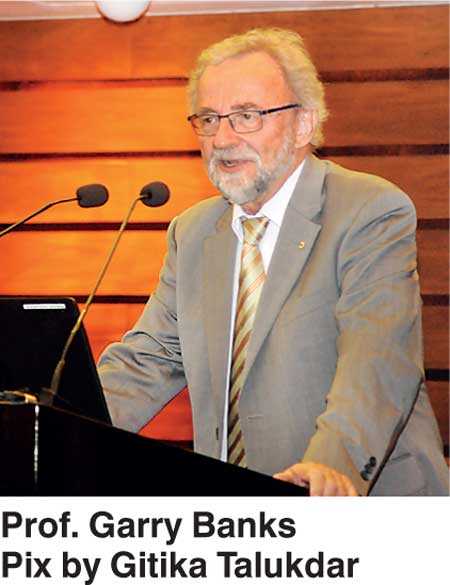Tuesday Feb 17, 2026
Tuesday Feb 17, 2026
Friday, 11 May 2018 00:05 - - {{hitsCtrl.values.hits}}
 By Shannon Jayawardena
By Shannon Jayawardena
A top expert on Wednesday declared that reforms created “winners” and “losers” in any country but the key process must be persisted with for the greater good of the people.
“Australia and Sri Lanka have many links but the one thing we have in common is the challenge of reforms that often involve both losers and winners,” Prof. Garry Banks, a Professorial Fellow at the Melbourne Institute of Economic and Social Research and Chair of the OECD Regulatory Policy Committee, said at a public lecture at the Central Bank.
Prof. Banks noted: “When I was here last in 1980, Sri Lanka was going through a period of reforms and of course now Sri Lanka is going through another process of the renewal of reforms and confronting all of the challenges that all countries face in a reform process.”
“My first message to you is that this is not a new problem and this is something that goes a long way. We have Niccolò Machiavelli saying there is nothing more difficult than to carry out and to initiate a new order of things, for the reformer has enemies in all those who profit through the old order and only lukewarm defenders are in those who profit from the new,” he added.
Banks said that Australia in 1970/1980 had very high made-to-measure tariff protections, extensive regulatory barriers towards competition and government monopolies in infrastructure and human resources that led to an uncompetitive economy.
“One of the challenges in reform, however, is that the governments know the administrative structures can compel the difficulties of reforms. In my country and I’m sure in yours, we have fragmented government administrations focused on different parts of our community and on different parts of the economy. This can make it difficult to get the sense of what’s at stake for the economy as a whole,” stressed Prof. Banks.
He also emphasised the fact that governments ideally have to think about incentives, flexibility and capabilities for productivity within enterprises. Import barriers in Australia are now very low and there has been a dramatic increase in the safety of agriculture and manufacturing during that period of time.
That in turn has led to an increase in trade intensity. There has also since been a surge in productivity and the main reason for that has been the reforms of the 1990s. Productivity is a major source of income growth stated Banks.
“But with this, the unemployment rate fell along with the protection level. Not only did unemployment decline but labour force participation went up and income gains were broadly distributed. Finally our economic rankings were restored. Australia was the only country that turned its reforms around after the 1990s,” noted Prof. Banks.
Sharing some implementation strategies, he said that Australia reduced barriers at the border first, liberalised trade unilaterally and reforms were implemented gradually but they ultimately enacted on a broad front, assisting an adjustment in sensitive sectors and regions.
Australia found that it was very important to make a case where people would understand, communicating the policy solutions through research, public consultations and leadership, asserted Prof. Banks.
Prof. Banks said: “It is quite a useful thing for a government to have at arm’s length the body that’s canvassing the policy ideas so that the government doesn’t implicate any of these proposals. They can watch how different ideas play out in the public commodity and see which ideas are likely to be ones that would get support from an actual policy.”
“We in Australia have benefitted by creating institutions to identify reform needs and public support which has worked out quite well for us. Other countries have also followed by establishing their own pro-reform institutions.”